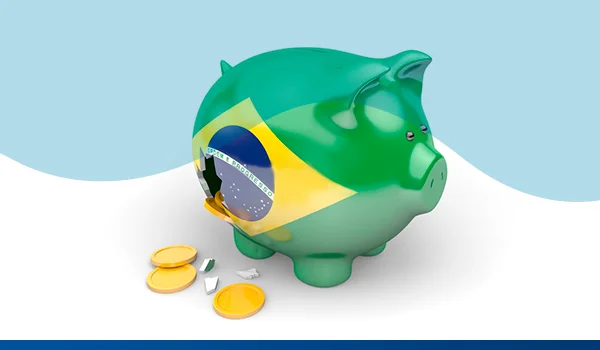Local investors also grow wary, reducing dollar short positions
06/25/2024

The pessimistic sentiment in the market, which has led to a sharp decline in the Brazilian real in recent weeks, is evident in the shifting positions of market participants regarding the currency. Foreign investors’ long positions in the dollar against the real (a bet on the appreciation of the U.S. dollar) reached a new record last week, hitting $79 billion, according to B3 data.
A year ago, this position was half its current size, around $40 billion in the last week of June. Broadly speaking, long positions in the dollar via derivatives (futures, currency swaps, currency coupons, and mini-dollars) are seen as a bet against the real, though this view is not entirely accurate as the data also include offshore investments by local investors and hedge strategies not necessarily betting on the Brazilian currency’s performance.
“The foreign long position in the dollar has been gradually increasing, but there was a clear acceleration in the last 30 days, triggered by fiscal concerns,” said Andrei Basilio, head of FX trading at XP. “Since this data can be somewhat ‘polluted,’ it’s essential to view these numbers with caution. Nonetheless, the volume is notable.”
Mr. Basilio suggests that the increase in dollar positions may also be driven by technical factors, not just the macroeconomic environment. “The real has had no respite this year. Algorithmic funds observe this ongoing trend and continue betting against the real until a reversal occurs,” he said. “Additionally, local funds are only experiencing redemptions, so there’s no room for riskier moves. This means local players aren’t in a position to make significant bets to profit from arbitrage opportunities.”
In late July 2023, when the foreign exchange rate approached R$4.72 per dollar, foreign investors’ long dollar positions via derivatives also hit then-record levels of nearly $50 billion. At that time, it was believed that foreign investors, when investing in Brazilian public securities and stocks, hedged in dollars to reduce their exposure to Brazil. If they had already bought stocks or public securities, they would protect against currency fluctuations by buying dollars.
Since the beginning of the year, however, B3 has recorded a significant outflow of foreign investors from the Brazilian stock market. As of last Thursday, the annual balance showed a negative flow of R$42 billion. In theory, as foreign investors exit the stock market, they might also relinquish their dollar hedges in the derivatives market, but the increasing position suggests otherwise.
“When a foreign fund dismantles a stock position, it retains cash—either to send out of the country or to buy another asset. Given the cost of exiting Brazil, these investors might stay long in dollars while waiting for a new opportunity to re-enter,” Mr. Basilio speculates.
In a scenario review, Andrea Kiguel, head of Americas strategy at Barclays, believes the outlook remains negative for the real, pointing to a “crisis of confidence” in Brazil requiring high risk premiums. “Authorities are showing goodwill to rebuild credibility, but it will take time to reflect on local assets, especially since local fund managers have limited firepower. We remain pessimistic about the real, which still needs a premium,” said Mr. Kiguel.
Barclays expects the exchange rate to reach R$5.45 per dollar by the end of the third quarter and end the year at R$5.35.
The pessimism surrounding the Brazilian currency is not exclusive to foreign investors. B3 data on derivative markets also show that local institutional investors have significantly reduced their short dollar positions against the real (which bet on the Brazilian currency’s appreciation). This amount has decreased from $17.4 billion at the beginning of the year to around $4.5 billion.
“The real started the year with considerable optimism, mainly due to carry trade. Currencies of countries with higher interest rates were favored, and this was true not only for Brazil but also for Mexico and Colombia. However, since April, this trend has reversed. The worsening risk perception abroad was strong, compounded by local factors like the change in fiscal targets and the more conservative stance of [Central Bank President] Roberto Campos Neto, indicating that the Central Bank itself was more concerned about the scenario,” said Gustavo Pi Okuyama, fixed income manager at Porto Asset Management.
Mr. Okuyama highlights that while the real has deteriorated alongside other currencies, it has not kept up with improvements when external conditions eased. “We’ve seen a disconnect between the real and external markets. There’s growing concern over fiscal issues and, secondly, monetary policy,” said Mr. Okuyama, who is currently avoiding positions in the real.
“We’ve seen significant and rapid deterioration of the real. The layered risk premiums are so high that some decompression is possible,” said Mr. Okuyama, noting the real’s volatility increase from about 7.5% to 11.5%. Although these levels are still contained, it represents a “significant risk increase,” according to the Porto Asset manager.
Currency trader Rodrigo Cabraitz of Principal Claritas points out that Brazilian investors were already seeing difficulties in government revenue generation at the beginning of the year. “This initial pillar prompted the purchase of protection, as there was uncertainty about the fiscal framework’s sustainability,” he said. “Additionally, the dissent in the May Monetary Policy Committee [COPOM] meeting increased pessimism about the local scenario.”
Given an extended position, some decompression may occur, Mr. Cabraitz suggests, noting better communication from the COPOM last week and the government’s intention to discuss spending unlinkage or even cuts.
“For foreign investors, the COPOM minutes, if aligned with market expectations, might be more important, while local investors are still waiting for more concrete measures from the government and the economic team,” Mr. Cabraitz said. “There’s room for decompression, but caution is needed.”
*Por Arthur Cagliari, Victor Rezende — São Paulo
Source: Valor International
